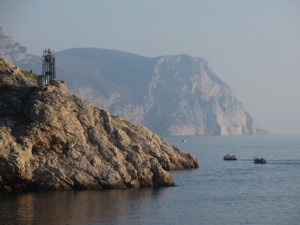You have no items in your cart. Want to get some nice things?
Go shopping
The front pages of our newspapers this morning were full once more of the worrying situation in Crimea. Alongside reports of Vladimir Putin’s confident TV appearance, in-depth analyses by experts shine a beam on different aspects of the problem: Crimea as a ‘jewel in Russia’s crown,’ Putin as a man fighting to restore his country to its former grandeur, Russia as a force determined never to be bypassed in foreign affairs. So we’re all becoming experts on the situation while we watch the politicians try and smooth things over. We try and guess from their attitudes how the show will go. Putin is relaxed, Hague ‘statesmanlike,’ Kerry ‘weak.’
What about the people in Crimea? Sevastopol is currently at the centre of a standoff between Russian troops and unarmed Ukrainian soldiers. A beautiful city on the Black Sea coast, it is a strategic point as it houses the Russian Black Sea fleet as part of an agreement reached in 1997. Mary Dejevky, in yesterday’s Independent, described the situation outside the Belbek airbase near Sevastopol as central to the action: “One mistake, one shot fired in anger and not only could the conflagration be immediate, but there would be little, far away in Moscow, that Vladimir Putin could do to stop it.”
Accordingly, the British government has advised all its nationals to leave Crimea immediately by ‘all practical means possible’. This brings to mind J G Ballard’s Empire of the Sun. The novel opens in Shanghai, a city that is gradually emptying of foreigners– the Americans have already left for Hong Kong or Singapore. But still, because the war is not there yet, it doesn’t feel real. “By contrast, the coming conflict between Britain and Japan, which everyone in Shanghai expected to break out in the summer of 1942, belonged to a realm of rumour.”
In the book, when the rumour becomes reality, everything is overturned. Jim, a young boy, and his family are wrenched away from a comfortable expatriate existence of private schools and cocktail parties and spend years in a Japanese Internment camp.
The same deceptive tranquillity mixed with tension fills the streets of Sevastopol. On 2nd March, Millin, a British teacher who has been living and teaching in Sevastopol since September 2013, described how calm the atmosphere was:
“Last night our school had a quiz which happened as normal, although there were only about twelve students there. The pub was near the main square where people have been gathering here. At 5pm, when I went past, there were knots of people, and a couple of Russian flags, but not many. An article on the BBC talks about a relaxed atmosphere and a kind of Saturday stroll in Sevastopol, and this is how it felt to me for all of the five minutes I was outside walking from the bus stop to the pub.”
But isn’t this what is most disturbing, this appearance of normality, with maybe less people around but no real feeling of a danger you can put your finger on? To come back to J G Ballard, he knew with what suddenness and violence war could strike. As a result of his experiences in Shanghai, he felt that everyday life was just a stage. As he said to Marianne Brace in a 2006 interview: “I realised that what we think of as conventional reality – this quiet suburban street, for instance – is just a stage set that can be swept away.”
We are oddly attuned nowadays to the sweeping away of stage sets. A country’s ruler can be received in great pomp by our governments one day, embraced and appeased, and the next day his dead eyes stare at us from the back of a truck driven by rebels. Or we can watch another despot, previously invincible, get hanged, over and over, on Youtube.
Similarly Damascus, holiday destination one day, pile of ruins the next…How does the viewer reconcile all this? Seeing such disasters repeated on the media blunts the feelings; news consumers feel powerless and so distance themselves from the horror, focusing instead on the politics or the economics of the conflict.
Art or literature can better bring the full reality of war to the understanding of viewers or readers. Think of Władysław Szpilman in Polanski’s film The Pianist, starved and hiding among the ruins of Warsaw. Because we share this one man’s suffering, we feel better able to understand what whole nations went through during the Second World War.

As for Sandy Millin, she is unsure how to react. On her blog, she says:
“I have no idea what will happen next. I’ve been asked whether I’m going to leave Crimea, as advised by the British Foreign and Commonwealth Office. At the moment the answer is no, because I don’t think it would help.”
She explains that for the moment, there is no sense of urgency in the streets.
“In my daily life, I feel completely safe. I actually see fewer soldiers, sailors and military units on a day-to-day basis than I did before the whole situation began. I’m constantly thinking about whether my decision to stay is the right one, but leaving would cause problems for the school I work for, would leave me with nothing to do for an indeterminate period of time, and would leave behind people I care about and worry about, people who don’t have the same luxury of being able to drop everything and leave. No matter what I’m doing, the situation is always at the back of my mind, even when I try to forget about it. I just hope it can be resolved soon, and without any more violence.”
This kind of behaviour from civilians, when bravery mixes with normal life, is what makes such crises poignant. Far away from the chess moves of the leaders, the lives of Sevastopol’s inhabitants have become uncertain. And British people who are able to leave, such as Sandy, are reluctant to abandon loved ones behind to face whatever comes.
As for the current stage set in Crimea, we can only hope that it remains solid and that the talks will lead to a resolution. For the moment, while the world speculates and muses about possible disruptions to the West’s gas supplies, Sevastopol awaits with illusive calm.


About Patricia Duffaud
Patricia Duffaud is a writer of mixed French and Northern Irish origin. She writes short stories, features and reviews and her work has appeared in Wasafiri Magazine, the Puffin Review and Thresholds. One of her stories was highly commended in the Gladstone's library's Mystery Lady short story competition. She is currently non-fiction editor for Litro online.



